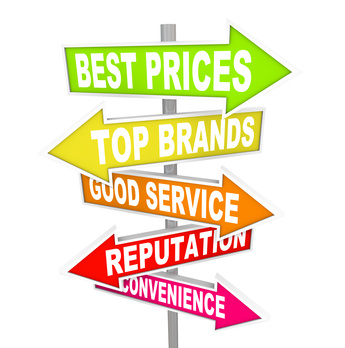The conversion rate of the typical sales website is dreadful. In your average bricks and mortar store the conversion rate is around 18%; most people who walk into a shop do not buy anything, but thankfully for the store owner, quite a few do. Online there is a different tale; the average online conversion rate is 2%. In other words the rate of buying in a bricks and mortar store is nine times higher than for a website.
 Some websites are lucky to have higher rates. Some British High Street Stores have reported online conversion rates around 5% and Amazon’s conversion rate is reportedly almost 10%. But even at that level of converting visitors into buyers it looks like Amazon would be better off closing down and setting up physical stores.
Some websites are lucky to have higher rates. Some British High Street Stores have reported online conversion rates around 5% and Amazon’s conversion rate is reportedly almost 10%. But even at that level of converting visitors into buyers it looks like Amazon would be better off closing down and setting up physical stores.
Why is it that compared with the “real world” the online conversion rate is so poor? After all, in theory it should be better. Buyers can have all the information they need, they can check out reviews from other buyers, they can talk to people on social networks about your products and services and they can compare prices. All within the comfort of their fireside armchair.
But therein lies the problem. People are simply overloaded with information and as a result find it much harder to make that decision to buy.
Take a look at the average e-commerce page these days. There are star ratings, user reviews, there are links to further details and there are endless pictures showing you every view imaginable. Now compare that level of information with a physical store. In a bricks and mortar shop all you see is the item and a price ticket. It all reminds me of one successful e-commerce operator I met several years ago whose attitude with his web pages was “do you want it or what?”. In other words, buy it now or disappear.
Yet everywhere you look online for e-commerce advice you’ll be told the opposite. You will see all sorts of “advice” suggesting you provide all the information and the social networking links which can help people make their purchasing decision. New research, however, suggests this could be the completely wrong approach altogether.
In a study of the impact of feedback on performance, researchers at the University of London found that when people were given either positive or negative feedback on a complex decision-making task they actually performed worse. What this research actually reveals is that the confusing amount of information provided in feedback makes our brains “give up”. The overload of information actually prevents us from making a decision.
It is likely that this is the same reason why so many websites perform so badly in terms of converting visitors into buyers; their brains are so overloaded with information they give up. Online retailers attempt to overcome this by getting more traffic. Maybe that’s all a waste of time. All that is needed is to simplify the decision-making process by reducing the amount of information on an e-commerce page.
Perhaps it is time for e-commerce operators to remember that old and useful adage – Keep It Simple Stupid. Or “do you want it or what?”.
Related articles
- Extreme Homepage Makeover: How to Increase Your Conversion Rate 106% (hubspot.com)
- Increase Your Website Conversion Rate With These 3 Simple Tweaks (shesgotclients.com)
- 5 Ways to Increase Landing Page Conversions (revenews.com)

